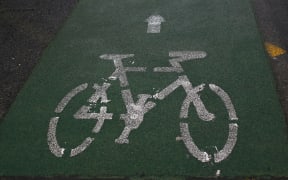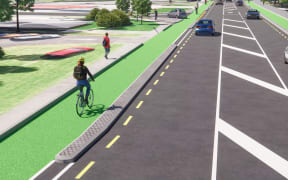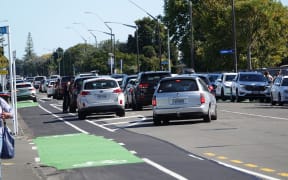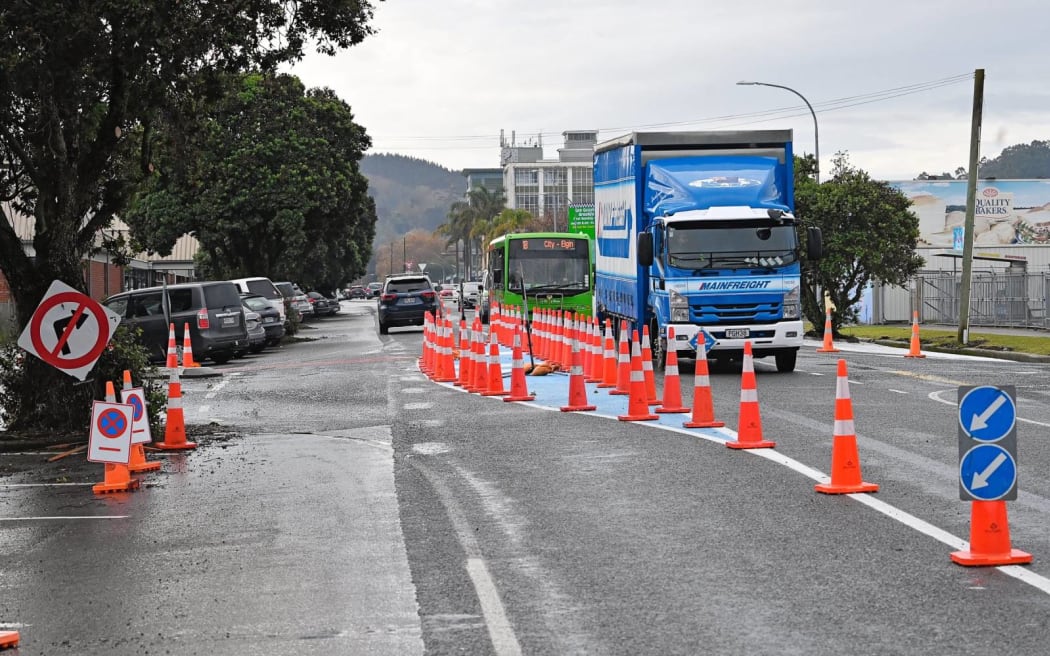
Grey Street development plans for active travel options have caused conflict among some Gisborne residents saying they want to see the council have a "no frills" budget. Photo: Paul Rickard / The Gisborne Herald
A "no-frills" budget, a plea to "fix our potholes" and "the Grey St fiasco" were all among submissions made at Gisborne District Council's Three-Year Plan hearings on Wednesday and Thursday.
Some residents said they object to plans to spend money on new cycle paths and walkways when potholes and recovery work need more funding.
The comments came as construction started last week on the 'Streets for People' project on Grey St - a scheme designed to incentivise people to drive less and walk or cycle more.
Streets for People is an NZ Transport Agency Waka Kotahi-funded initiative in partnership with the council and Tai Rāwhiti Adventure Trust.
Of the project's $900,000 anticipated cost, 10 percent is funded by the council.
Katherine Utting presented for submitter Linda Francis, who has called it the "Grey St fiasco".

"Ratepayers are screaming for the council to fix our potholes," she said.
The draft plan mentioned figures of $500,000 for a wastewater treatment plan and $3.3 million for cycleways, she said.
"Where are your priorities?" she asked.
"The unemployment rate in Gisborne has risen to 7.2 percent, whereas nationally it is 4.3 percent," she said, quoting recent quarterly figures from Stats NZ.
"Cost of living is rising and ratepayers are cutting spending back to the bare minimum. [We're] living on a no-frills budget ... council needs to do the same."
Under the Three-Year Plan, the council's proposed spending for cycleways and footpaths aims to encourage different travel choices. This includes the Streets for People project, reducing speeds around schools and townships, and road safety campaigns.
"The only project in the next three years is extending the Taruheru River shared path from Mitre 10 to the Botanical Gardens," the plan says.
Seven of the 41 submissions presented to council spoke of objections to ratepayers' money being put towards new cycleways and footpaths.
"There seems to be a mismatch between what our council wants our city to look like and what residents want for the city of Gisborne," Helena Nickerson said in her submission.
Federation Farmers Gisborne-Wairoa provincial president Charles Reynolds said about Grey St: "We need to make sure council spending is 'need to have', and not 'nice to have'."
Four submissions presented during the hearings supported cycle paths.
Tapuwae Tai Rāwhiti Trails' (TTT) Lyall Evans said they supported the council's proposed $3.3m spend on cycle and walkways.
"We need a bright star to shine on the gloom," he said.
He believed the TTT plans could improve the council's existing programme to make Gisborne more cycle-friendly.
"We could use this funding to do more than the one kilometre earmarked from Mitre 10 to the Botanical Gardens," a written submission from TTT said.
The submission shared concern for council debt but noted the future benefit of the project.
"[We] know the young and their young will be beneficiaries of this trail in the next 20 years - in health education and wellbeing."
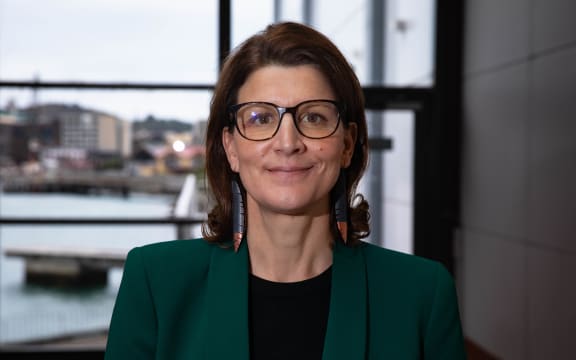
Photo: RNZ / Angus Dreaver
Harley Dibble spoke on behalf of Te Wero ia Wenerei Tairāwhit, an organisation encouraging people to bus, walk, scooter, run or carpool on Wednesdays.
He said schools were enjoying taking part in this programme and they were seeing behaviour improvements in kids on Wednesdays.
According to Dibble's written submission, the council has previously donated $5000 to its cause.
Manu Caddie, of Teu Wea Charitable Trust, said they supported the submission.
At the end of submissions, Mayor Rehette Stoltz said: "We have 50,000 people in our region with 50,000 different opinions.
"Some people want us to spend more in certain areas. Some people absolutely don't want us to spend more.
"It's a balancing act."
LDR is local body journalism co-funded by RNZ and NZ On Air.
